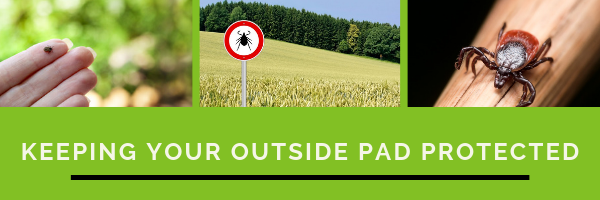508-587-4309 | Customer Login
Before you hit the backyard for some fun in the sun, take a moment to Protect Your Outside Pad. After a record 21 days of rain in April, tick and mosquito activity in Massachusetts is already off to a busy start this season - with some of the most favorable conditions these pest have ever had!
Spring is a critical period to treat for ticks, and begin applying the residual barrier that will reduce mosquito activity as temperatures rise. By treating in the spring, the goal is to maximize your time outdoors for BBQ's, graduation parties, and play time this summer.
Coverage You Can Count On!

New England's #1 choice for tick and mosquito control
- Treatments are customized to offer targeted control to areas of concern
- Products are EPA-registered and include environmentally-friendly and organic control
- 200-gallon hydraulic sprayers coat the underbrush and blast away breeding grounds
- Our team includes state certified experts in tick and mosquito control
- We consult on ways you can modify your landscaping to reduce harborage areas
How to Get Started
- Fill out the form on the right to have our inspector take a look at your property.
- We'll recommend the best seasonal treatment package, and offer you a discounted treatment, as a thanks for getting started.
- Ask about our P30 Pad Protection Plans to stay covered all year from 30 pests, including ticks and mosquitoes
Mosquito and Tick FAQ’s
Do you treat my whole lawn?
There’s no need to treat the lawn itself. Our treatment is a high-pressure, residual application, applied with 200-gallon hydraulic sprayers, that is concentrated on surrounding brush and vegetation. These are the areas ticks are most likely to traverse. Creating a residual barrier around your lawn is an important strategy in reducing tick activity all over your property.
Do you offer organic options? Are they as effective as the traditional products?
We do offer both organic and environmentally-friendly, low-impact products. All treatment options are effective. The manner in which the products are applied varies depending on the type of product, as well as the intervals between treatments.
During what months should treatments be performed?
Generally in New England, we treat from April through November. This period of time represents the most active time of year for tick and mosquito activity.
How many treatments do you recommend? How frequently are they done?
In most cases, treatments are spaced about 4 weeks apart. That is the length of time that we generally recommend to ensure the product’s residual capabilities remain effective.
Are the treatments still effective if we have inclement weather?
The products used offer residual capabilities, meaning it will stay effective even in inclement weather. Over time, and during periods of heavy rain, the product will begin to break down, which is why we recommend a treatment every four weeks.
Should we be concerned about our fish pond/vegetable gardens?
During our initial property inspection, we note all sensitive areas, such as pools, ponds, gardens, etc. This site report is available to the team that treats your property. Strict guidelines are followed as to the treatment locations and methods.
Should we still use repellents/treat our pets?
You should always refer to the EPA’s website for guidelines on which repellents to use and how to apply them. You should also consult with your veterinarian on how to protect your pets. We find that, in general, many people do continue to use repellents and other forms of EPA-recommended preventative measures.
*Offer valid for first time tick and mosquito control customers. Free treatment valid with qualifying, prepayed purchase of full season tick and mosquito control package. Cannot be combined with any other offers or discounts. Offer expires April 30, 2019

